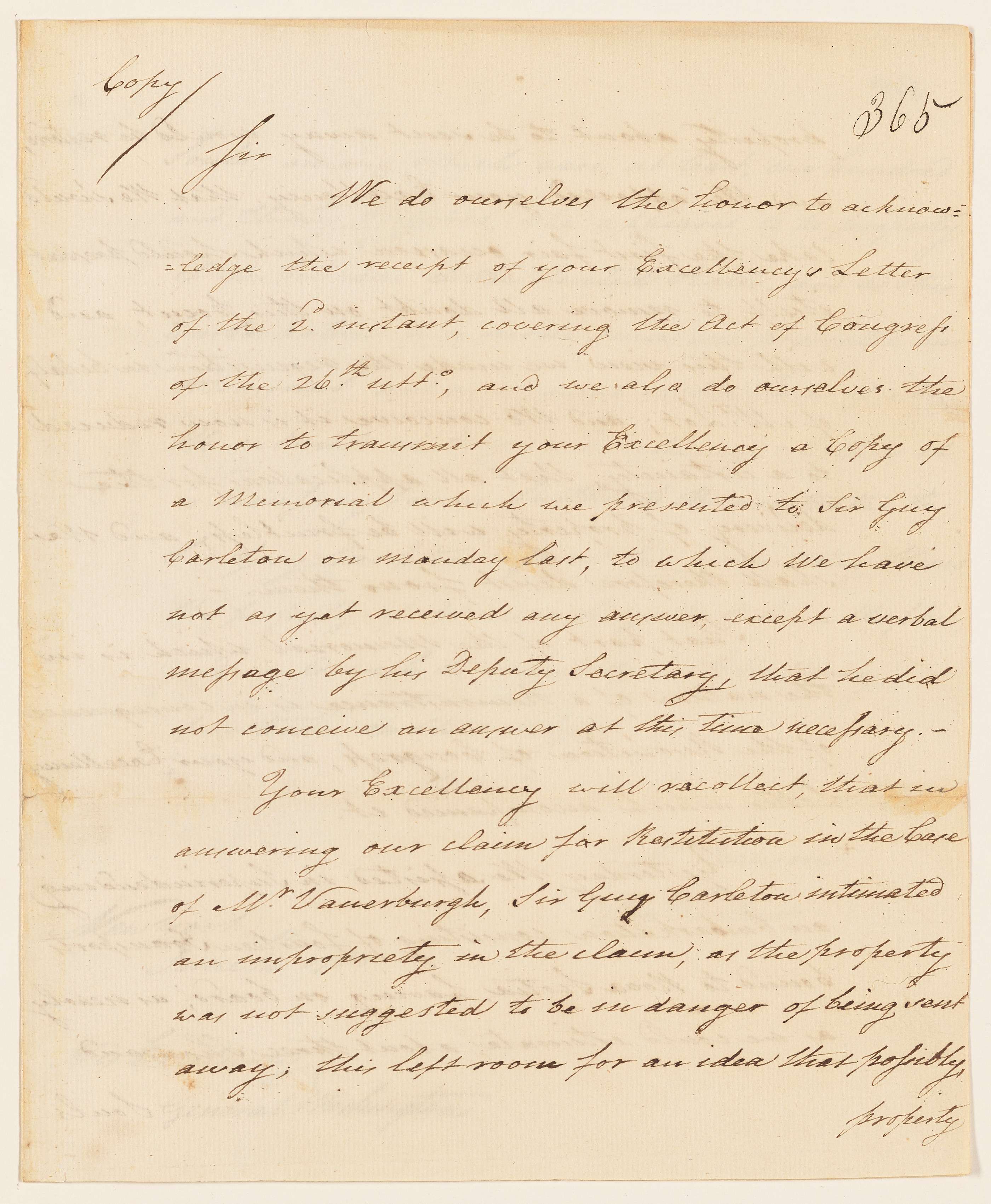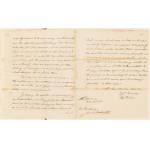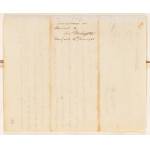Letter from Embarkation Commissioners to General Washington
6/14/1783
Add to Favorites:
Add all page(s) of this document to activity:

Add only page 1 to activity:
Add only page 2 to activity:
Add only page 3 to activity:
George Washington appointed Egbert Benson, William S. Smith, and Daniel Parker to be Commissioners of Embarkation and oversee the British evacuation from the United States at the conclusion of the Revolutionary War. Benson and Parker sent this letter from New York City to General Washington, reporting that the British were not following the agreements made in the treaty that ended the war.
Per the Preliminary Articles of Peace, signed in Paris on November 30, 1782, the United Kingdom was to return all property seized during the War, including slaves. After trying to restore a horse taken from a Mr. James Vanderburgh, the commissioners reported that "We conceive it is now reduced to a certainty, that all applications for the delivery of property will be fruitless, and We shall therefore desist from them."
The commissioners also reported on former slaves being evacuated by the British and asked Washington what to do about it. Per the treaty, the United States demanded the return of escaped slaves. But Sir Guy Carleton, commander of British forces during the Revolutionary War, countered that, under the King’s orders, slaves reaching British lines were to be freed. Sir Carleton intended to keep the promise of freedom that was made to African Americans who joined and fought for the British.
Britain evacuated about 3,000 enslaved African Americans, indentured servants, and freedmen to the British colony of Nova Scotia in Canada along with British soldiers. They carefully recorded all persons boarding British ships in New York.
The "Book of Negroes, or "Inspection Roll of Negroes" as the American version is called, listed those who were evacuated – to tally the loss of "property" for which the British government might compensate the United States at a later date. (No record of that payment has been found.) In 1792, over 1,000 of the new African Canadians continued on and settled back on the continent of Africa, establishing the city of Freetown, Sierra Leone.
Per the Preliminary Articles of Peace, signed in Paris on November 30, 1782, the United Kingdom was to return all property seized during the War, including slaves. After trying to restore a horse taken from a Mr. James Vanderburgh, the commissioners reported that "We conceive it is now reduced to a certainty, that all applications for the delivery of property will be fruitless, and We shall therefore desist from them."
The commissioners also reported on former slaves being evacuated by the British and asked Washington what to do about it. Per the treaty, the United States demanded the return of escaped slaves. But Sir Guy Carleton, commander of British forces during the Revolutionary War, countered that, under the King’s orders, slaves reaching British lines were to be freed. Sir Carleton intended to keep the promise of freedom that was made to African Americans who joined and fought for the British.
Britain evacuated about 3,000 enslaved African Americans, indentured servants, and freedmen to the British colony of Nova Scotia in Canada along with British soldiers. They carefully recorded all persons boarding British ships in New York.
The "Book of Negroes, or "Inspection Roll of Negroes" as the American version is called, listed those who were evacuated – to tally the loss of "property" for which the British government might compensate the United States at a later date. (No record of that payment has been found.) In 1792, over 1,000 of the new African Canadians continued on and settled back on the continent of Africa, establishing the city of Freetown, Sierra Leone.
Transcript
Copy/Sir
We do ourselves the honor to acknowledge the receipt of your Excellency's Letter of the 2d instant, covering the Act of Congress of the 26th ult, and we also do ourselves the honor to transmit your Excellency a Copy of a Memorial which we presented to Sir Guy Carleton on Monday last, to which we have not as yet received any answer, except a verbal message by his Deputy Secretary, that he did not conceive an answer at this time necessary. -
Your Excellency will recollect, that in answering our claim for Restitution in the Case of Mr. Vanderburgh, Sir Guy Carleton intimated an impropriety in the claim, as the property was not suggested to be in danger of being sent away, this left room for an idea that possibly, property
[left side of page]
property about to be sent away would be restored, and We apprised your Excellency, that We should take the first fair occasion which should present itself, to remove all doubt on this point, and with this view we made the requisition in behalf of Mr. Lot; and We conceive it is now reduced to a certainty, that all applications for the delivery of property will be fruitless, and We shall therefore desist from them. -
That part of the Memorial which is in the nature of a Remonstrance is in consequence of the Resolution of Congress, and your Excellency's Letter, which accompanied it.
Yesterday We assisted in Superintending an Embarkation, consisting of fourteen Transports bound to Nova Scotia, having on board, as nearly as we could estimate, about three thousand souls
[right side of page]
Souls, among which were, at least, one hundred and thirty Negroes, who appear to be property of the Citizens of the United States, and as this Embarkation was made since we presented our Memorial, and as it were in the face of it, We submit it to your Excellency, whether it is necessary for us further to Remonstrate to Sir Guy Carleton against his permitting Slaves, the property of American Subjects, to leave this place, and could wish to receive your Excellency's directions on that subject -
We have the honor to be [illegible]
Egbt. Benson
Danl Parker
New York
June 14th 1783
His Excellency
General Washington
Commissioners at New York to Genl. Washington
New York 14th June 1783
This primary source comes from the Records of the Continental and Confederation Congresses and the Constitutional Convention.
Full Citation: Letter from Embarkation Commissioners to General Washington; 6/14/1783; Miscellaneous Papers of the Continental Congress, 1774 - 1789; Records of the Continental and Confederation Congresses and the Constitutional Convention, Record Group 360; National Archives Building, Washington, DC. [Online Version, https://www.docsteach.org/documents/document/embarkation-commissioners-to-washington, April 25, 2024]Rights: Public Domain, Free of Known Copyright Restrictions. Learn more on our privacy and legal page.






